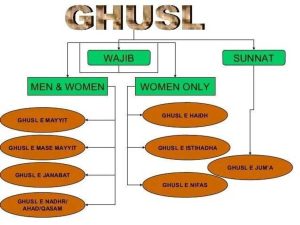A STEP-BY-STEP GUIDE ON HOW TO PERFORM GHUSL

Ghusl, the ritual purification bath in Islam, holds deep spiritual significance. It is a powerful act of worship that ensures cleanliness and spiritual readiness for prayer and other sacred acts. While essential, the process can feel overwhelming for those unfamiliar with its steps.
Whether you’re performing ghusl after an obligatory event or preparing for Jumu’ah (Friday prayer), knowing how to perform ghusl correctly is vital. In this comprehensive guide, we will walk you through each step of ghusl, explain when it’s required, and answer some of the most frequently asked questions.
HOW TO PERFORM GHUSL: A DETAILED PROCESS
Here is the correct method to perform ghusl:
1.Make the Intention (Niyyah): Intend in your heart that you are performing ghusl to purify yourself.
2.Wash Hands Three Times: Begin by washing both hands up to the wrists three times.
3.Perform Istinja: Cleanse yourself of any physical impurities from urination or defecation.
4.Perform Wudu: Complete the regular ablution as you would before prayer.
5.Pour Water Over the Head: Start by pouring water over the head three times, ensuring it reaches the scalp.
6.Wash the Right Side of the Body: Pour water over the right shoulder.
7.Wash the Left Side of the Body: Pour water over the left shoulder.
8.Ensure Complete Coverage: Rub water over the entire body, making sure no area is left dry.
Note: Refrain from talking during ghusl unless necessary.
ESSENTIAL ACTS (FARD) OF GHUSL
Islamic scholars agree that ghusl is valid only when these three obligatory acts are fulfilled:
1.Rinsing the Mouth (Madmadah): Water must reach the entire mouth. During fasting, take care to avoid swallowing.
2.Sniffing Water into the Nose (Istinshaaq): Water should reach the soft bone inside the nose.
3.Washing the Entire Body: Ensure that no part of the body, even a hair’s breadth, remains dry.
HOW TO PERFORM GHUSL FOR FEMALES
The fard (obligatory) acts of ghusl are the same for both men and women. The belief that women must perform additional acts, such as cleaning with a cloth inside private parts, is a misconception. However, women must ensure water reaches all external body parts, particularly areas where access is easy—just like ensuring water reaches under a ring or inside the navel.
WHEN TO PERFORM GHUSL
Obligatory Ghusl (Fard):
Ghusl becomes mandatory in the following situations:
1.After sexual intercourse.
2.After experiencing a wet dream.
3.After ejaculation.
4.After the menstrual cycle ends.
5.After postnatal bleeding (nifas) ends.
One cannot perform acts of worship—such as prayer or touching the Qur’an—without performing ghusl in these cases.
Sunnah Ghusl:
Ghusl is highly recommended (Sunnah) in these situations:
1.Before Friday prayer.
2.Before Eid prayers.
3.Upon entering Ihram for Hajj or Umrah.
4.On the Day of Arafah.
Mustahabb Ghusl (Recommended):
These are occasions where ghusl is encouraged but not obligatory:
•When a person converts to Islam.
•Upon reaching puberty.
•After recovery from insanity.
•After cupping or bloodletting.
•After washing a deceased person.
•Before worship on special nights (e.g., Laylat al-Qadr, mid-Sha’ban).
•Before entering Mecca or Medina.
•For Tawaf al-Ziyarah.
•During solar eclipse prayers or Salat al-Istisqa (rain prayer).
•At times of fear or unusual darkness.
COMMON MISTAKES TO AVOID DURING GHUSL
•Neglecting Istinja: Always cleanse the body of impurities before starting ghusl.
•Delaying Ghusl: Obligatory ghusl should not be delayed, as it prevents angels of mercy from entering the home.
•Entering a Mosque Without Ghusl: It is prohibited for someone in a state of major impurity to enter a mosque, perform tawaf, or touch the Qur’an.
•Reciting Duas in Impurity: Although it is permitted to recite Durood Shareef or respond to the adhan, it’s preferable to do so after rinsing the mouth or performing wudu.
•Not Performing Tayammum When Water Is Unavailable: If water is not accessible, tayammum should be performed instead.
FREQUENTLY ASKED QUESTIONS ABOUT GHUSL
Q: Does ghusl count as wudu?
A: If it is an obligatory ghusl, it includes wudu. For Sunnah or Mustahabb ghusl, wudu must be done separately.
Q: Can you fast without ghusl?
A: Yes, your fast is valid. However, it is best to perform ghusl before Fajr if required.
Q: Can you do ghusl with braids?
A: If water reaches the roots, untying braids isn’t necessary. Otherwise, the braids should be undone.
Q: Does precum require ghusl?
A: No, ghusl is not required for precum. Regular wudu suffices.
Q: How to perform ghusl after menstruation?
A: Women should follow the same steps outlined above, ensuring water reaches all parts of the body, especially the hair and external private areas.
CONCLUSION
Performing ghusl is not just a physical act—it’s a spiritual renewal that reflects a believer’s commitment to purity, worship, and closeness to Allah. By understanding how to perform ghusl correctly, you ensure your acts of worship are valid and meaningful.
Approach this sacred act with mindfulness, and let it be a source of spiritual elevation and peace. As with all Islamic practices, consistency, sincerity, and knowledge will deepen your connection with your faith and your Creator.

